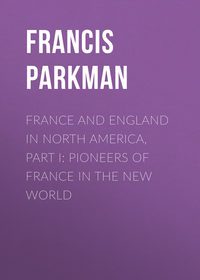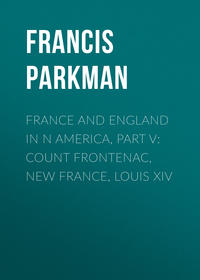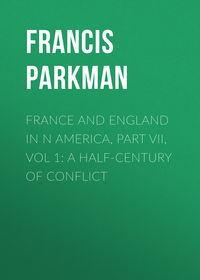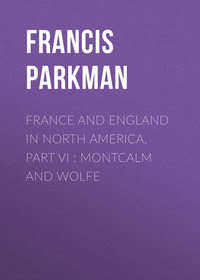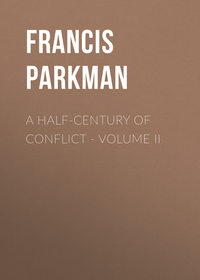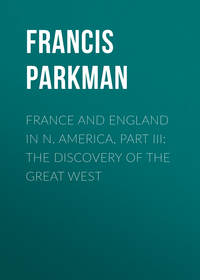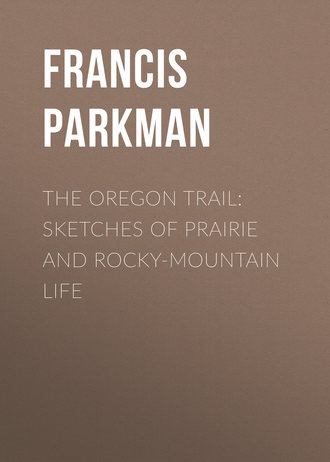 полная версия
полная версияThe Oregon Trail: Sketches of Prairie and Rocky-Mountain Life
Shaw and I were much better fitted for this mode of traveling than we had been on betaking ourselves to the prairies for the first time a few months before. The daily routine had ceased to be a novelty. All the details of the journey and the camp had become familiar to us. We had seen life under a new aspect; the human biped had been reduced to his primitive condition. We had lived without law to protect, a roof to shelter, or garment of cloth to cover us. One of us at least had been without bread, and without salt to season his food. Our idea of what is indispensable to human existence and enjoyment had been wonderfully curtailed, and a horse, a rifle, and a knife seemed to make up the whole of life’s necessaries. For these once obtained, together with the skill to use them, all else that is essential would follow in their train, and a host of luxuries besides. One other lesson our short prairie experience had taught us; that of profound contentment in the present, and utter contempt for what the future might bring forth.
These principles established, we prepared to leave Fort Laramie. On the fourth day of August, early in the afternoon, we bade a final adieu to its hospitable gateway. Again Shaw and I were riding side by side on the prairie. For the first fifty miles we had companions with us; Troche, a little trapper, and Rouville, a nondescript in the employ of the Fur Company, who were going to join the trader Bisonette at his encampment near the head of Horse Creek. We rode only six or eight miles that afternoon before we came to a little brook traversing the barren prairie. All along its course grew copses of young wild-cherry trees, loaded with ripe fruit, and almost concealing the gliding thread of water with their dense growth, while on each side rose swells of rich green grass. Here we encamped; and being much too indolent to pitch our tent, we flung our saddles on the ground, spread a pair of buffalo robes, lay down upon them, and began to smoke. Meanwhile, Delorier busied himself with his hissing frying-pan, and Raymond stood guard over the band of grazing horses. Delorier had an active assistant in Rouville, who professed great skill in the culinary art, and seizing upon a fork, began to lend his zealous aid in making ready supper. Indeed, according to his own belief, Rouville was a man of universal knowledge, and he lost no opportunity to display his manifold accomplishments. He had been a circus-rider at St. Louis, and once he rode round Fort Laramie on his head, to the utter bewilderment of all the Indians. He was also noted as the wit of the Fort; and as he had considerable humor and abundant vivacity, he contributed more that night to the liveliness of the camp than all the rest of the party put together. At one instant he would be kneeling by Delorier, instructing him in the true method of frying antelope steaks, then he would come and seat himself at our side, dilating upon the orthodox fashion of braiding up a horse’s tail, telling apocryphal stories how he had killed a buffalo bull with a knife, having first cut off his tail when at full speed, or relating whimsical anecdotes of the bourgeois Papin. At last he snatched up a volume of Shakespeare that was lying on the grass, and halted and stumbled through a line or two to prove that he could read. He went gamboling about the camp, chattering like some frolicsome ape; and whatever he was doing at one moment, the presumption was a sure one that he would not be doing it the next. His companion Troche sat silently on the grass, not speaking a word, but keeping a vigilant eye on a very ugly little Utah squaw, of whom he was extremely jealous.
On the next day we traveled farther, crossing the wide sterile basin called Goche’s Hole. Toward night we became involved among deep ravines; and being also unable to find water, our journey was protracted to a very late hour. On the next morning we had to pass a long line of bluffs, whose raw sides, wrought upon by rains and storms, were of a ghastly whiteness most oppressive to the sight. As we ascended a gap in these hills, the way was marked by huge foot-prints, like those of a human giant. They were the track of the grizzly bear; and on the previous day also we had seen abundance of them along the dry channels of the streams we had passed. Immediately after this we were crossing a barren plain, spreading in long and gentle undulations to the horizon. Though the sun was bright, there was a light haze in the atmosphere. The distant hills assumed strange, distorted forms, and the edge of the horizon was continually changing its aspect. Shaw and I were riding together, and Henry Chatillon was alone, a few rods before us; he stopped his horse suddenly, and turning round with the peculiar eager and earnest expression which he always wore when excited, he called to us to come forward. We galloped to his side. Henry pointed toward a black speck on the gray swell of the prairie, apparently about a mile off. “It must be a bear,” said he; “come, now, we shall all have some sport. Better fun to fight him than to fight an old buffalo bull; grizzly bear so strong and smart.”
So we all galloped forward together, prepared for a hard fight; for these bears, though clumsy in appearance and extremely large, are incredibly fierce and active. The swell of the prairie concealed the black object from our view. Immediately after it appeared again. But now it seemed quite near to us; and as we looked at it in astonishment, it suddenly separated into two parts, each of which took wing and flew away. We stopped our horses and looked round at Henry, whose face exhibited a curious mixture of mirth and mortification. His hawk’s eye had been so completely deceived by the peculiar atmosphere that he had mistaken two large crows at the distance of fifty rods for a grizzly bear a mile off. To the journey’s end Henry never heard the last of the grizzly bear with wings.
In the afternoon we came to the foot of a considerable hill. As we ascended it Rouville began to ask questions concerning our conditions and prospects at home, and Shaw was edifying him with a minute account of an imaginary wife and child, to which he listened with implicit faith. Reaching the top of the hill we saw the windings of Horse Creek on the plains below us, and a little on the left we could distinguish the camp of Bisonette among the trees and copses along the course of the stream. Rouville’s face assumed just then a most ludicrously blank expression. We inquired what was the matter, when it appeared that Bisonette had sent him from this place to Fort Laramie with the sole object of bringing back a supply of tobacco. Our rattle-brain friend, from the time of his reaching the Fort up to the present moment, had entirely forgotten the object of his journey, and had ridden a dangerous hundred miles for nothing. Descending to Horse Creek we forded it, and on the opposite bank a solitary Indian sat on horseback under a tree. He said nothing, but turned and led the way toward the camp. Bisonette had made choice of an admirable position. The stream, with its thick growth of trees, inclosed on three sides a wide green meadow, where about forty Dakota lodges were pitched in a circle, and beyond them half a dozen lodges of the friendly Cheyenne. Bisonette himself lived in the Indian manner. Riding up to his lodge, we found him seated at the head of it, surrounded by various appliances of comfort not common on the prairie. His squaw was near him, and rosy children were scrambling about in printed-calico gowns; Paul Dorion also, with his leathery face and old white capote, was seated in the lodge, together with Antoine Le Rouge, a half-breed Pawnee, Sibille, a trader, and several other white men.
“It will do you no harm,” said Bisonette, “to stay here with us for a day or two, before you start for the Pueblo.”
We accepted the invitation, and pitched our tent on a rising ground above the camp and close to the edge of the trees. Bisonette soon invited us to a feast, and we suffered abundance of the same sort of attention from his Indian associates. The reader may possibly recollect that when I joined the Indian village, beyond the Black Hills, I found that a few families were absent, having declined to pass the mountains along with the rest. The Indians in Bisonette’s camp consisted of these very families, and many of them came to me that evening to inquire after their relatives and friends. They were not a little mortified to learn that while they, from their own timidity and indolence, were almost in a starving condition, the rest of the village had provided their lodges for the next season, laid in a great stock of provisions, and were living in abundance and luxury. Bisonette’s companions had been sustaining themselves for some time on wild cherries, which the squaws pounded up, stones and all, and spread on buffalo robes, to dry in the sun; they were then eaten without further preparation, or used as an ingredient in various delectable compounds.
On the next day the camp was in commotion with a new arrival. A single Indian had come with his family the whole way from the Arkansas. As he passed among the lodges he put on an expression of unusual dignity and importance, and gave out that he had brought great news to tell the whites. Soon after the squaws had erected his lodge, he sent his little son to invite all the white men, and all the most distinguished Indians, to a feast. The guests arrived and sat wedged together, shoulder to shoulder, within the hot and suffocating lodge. The Stabber, for that was our entertainer’s name, had killed an old buffalo bull on his way. This veteran’s boiled tripe, tougher than leather, formed the main item of the repast. For the rest, it consisted of wild cherries and grease boiled together in a large copper kettle. The feast was distributed, and for a moment all was silent, strenuous exertion; then each guest, with one or two exceptions, however, turned his wooden dish bottom upward to prove that he had done full justice to his entertainer’s hospitality. The Stabber next produced his chopping board, on which he prepared the mixture for smoking, and filled several pipes, which circulated among the company. This done, he seated himself upright on his couch, and began with much gesticulation to tell his story. I will not repeat his childish jargon. It was so entangled, like the greater part of an Indian’s stories, with absurd and contradictory details, that it was almost impossible to disengage from it a single particle of truth. All that we could gather was the following:
He had been on the Arkansas, and there he had seen six great war parties of whites. He had never believed before that the whole world contained half so many white men. They all had large horses, long knives, and short rifles, and some of them were attired alike in the most splendid war dresses he had ever seen. From this account it was clear that bodies of dragoons and perhaps also of volunteer cavalry had been passing up the Arkansas. The Stabber had also seen a great many of the white lodges of the Meneaska, drawn by their long-horned buffalo. These could be nothing else than covered ox-wagons used no doubt in transporting stores for the troops. Soon after seeing this, our host had met an Indian who had lately come from among the Comanches. The latter had told him that all the Mexicans had gone out to a great buffalo hunt. That the Americans had hid themselves in a ravine. When the Mexicans had shot away all their arrows, the Americans had fired their guns, raised their war-whoop, rushed out, and killed them all. We could only infer from this that war had been declared with Mexico, and a battle fought in which the Americans were victorious. When, some weeks after, we arrived at the Pueblo, we heard of General Kearny’s march up the Arkansas and of General Taylor’s victories at Matamoras.
As the sun was setting that evening a great crowd gathered on the plain by the side of our tent, to try the speed of their horses. These were of every shape, size, and color. Some came from California, some from the States, some from among the mountains, and some from the wild bands of the prairie. They were of every hue—white, black, red, and gray, or mottled and clouded with a strange variety of colors. They all had a wild and startled look, very different from the staid and sober aspect of a well-bred city steed. Those most noted for swiftness and spirit were decorated with eagle-feathers dangling from their manes and tails. Fifty or sixty Dakotas were present, wrapped from head to foot in their heavy robes of whitened hide. There were also a considerable number of the Cheyenne, many of whom wore gaudy Mexican ponchos swathed around their shoulders, but leaving the right arm bare. Mingled among the crowd of Indians were a number of Canadians, chiefly in the employ of Bisonette; men, whose home is in the wilderness, and who love the camp fire better than the domestic hearth. They are contented and happy in the midst of hardship, privation, and danger. Their cheerfulness and gayety is irrepressible, and no people on earth understand better how “to daff the world aside and bid it pass.” Besides these, were two or three half-breeds, a race of rather extraordinary composition, being according to the common saying half Indian, half white man, and half devil. Antoine Le Rouge was the most conspicuous among them, with his loose pantaloons and his fluttering calico skirt. A handkerchief was bound round his head to confine his black snaky hair, and his small eyes twinkled beneath it, with a mischievous luster. He had a fine cream-colored horse whose speed he must needs try along with the rest. So he threw off the rude high-peaked saddle, and substituting a piece of buffalo robe, leaped lightly into his seat. The space was cleared, the word was given, and he and his Indian rival darted out like lightning from among the crowd, each stretching forward over his horse’s neck and plying his heavy Indian whip with might and main. A moment, and both were lost in the gloom; but Antoine soon came riding back victorious, exultingly patting the neck of his quivering and panting horse.
About midnight, as I lay asleep, wrapped in a buffalo robe on the ground by the side of our cart, Raymond came up and woke me. Something he said, was going forward which I would like to see. Looking down into camp I saw, on the farther side of it, a great number of Indians gathered around a fire, the bright glare of which made them visible through the thick darkness; while from the midst of them proceeded a loud, measured chant which would have killed Paganini outright, broken occasionally by a burst of sharp yells. I gathered the robe around me, for the night was cold, and walked down to the spot. The dark throng of Indians was so dense that they almost intercepted the light of the flame. As I was pushing among them with but little ceremony, a chief interposed himself, and I was given to understand that a white man must not approach the scene of their solemnities too closely. By passing round to the other side, where there was a little opening in the crowd, I could see clearly what was going forward, without intruding my unhallowed presence into the inner circle. The society of the “Strong Hearts” were engaged in one of their dances. The Strong Hearts are a warlike association, comprising men of both the Dakota and Cheyenne nations, and entirely composed, or supposed to be so, of young braves of the highest mettle. Its fundamental principle is the admirable one of never retreating from any enterprise once commenced. All these Indian associations have a tutelary spirit. That of the Strong Hearts is embodied in the fox, an animal which a white man would hardly have selected for a similar purpose, though his subtle and cautious character agrees well enough with an Indian’s notions of what is honorable in warfare. The dancers were circling round and round the fire, each figure brightly illumined at one moment by the yellow light, and at the next drawn in blackest shadow as it passed between the flame and the spectator. They would imitate with the most ludicrous exactness the motions and the voice of their sly patron the fox. Then a startling yell would be given. Many other warriors would leap into the ring, and with faces upturned toward the starless sky, they would all stamp, and whoop, and brandish their weapons like so many frantic devils.
Until the next afternoon we were still remaining with Bisonette. My companion and I with our three attendants then left his camp for the Pueblo, a distance of three hundred miles, and we supposed the journey would occupy about a fortnight. During this time we all earnestly hoped that we might not meet a single human being, for should we encounter any, they would in all probability be enemies, ferocious robbers and murderers, in whose eyes our rifles would be our only passports. For the first two days nothing worth mentioning took place. On the third morning, however, an untoward incident occurred. We were encamped by the side of a little brook in an extensive hollow of the plain. Delorier was up long before daylight, and before he began to prepare breakfast he turned loose all the horses, as in duty bound. There was a cold mist clinging close to the ground, and by the time the rest of us were awake the animals were invisible. It was only after a long and anxious search that we could discover by their tracks the direction they had taken. They had all set off for Fort Laramie, following the guidance of a mutinous old mule, and though many of them were hobbled they had driven three miles before they could be overtaken and driven back.
For the following two or three days we were passing over an arid desert. The only vegetation was a few tufts of short grass, dried and shriveled by the heat. There was an abundance of strange insects and reptiles. Huge crickets, black and bottle green, and wingless grasshoppers of the most extravagant dimensions, were tumbling about our horses’ feet, and lizards without numbers were darting like lightning among the tufts of grass. The most curious animal, however, was that commonly called the horned frog. I caught one of them and consigned him to the care of Delorier, who tied him up in a moccasin. About a month after this I examined the prisoner’s condition, and finding him still lively and active, I provided him with a cage of buffalo hide, which was hung up in the cart. In this manner he arrived safely at the settlements. From thence he traveled the whole way to Boston packed closely in a trunk, being regaled with fresh air regularly every night. When he reached his destination he was deposited under a glass case, where he sat for some months in great tranquillity and composure, alternately dilating and contracting his white throat to the admiration of his visitors. At length, one morning, about the middle of winter, he gave up the ghost. His death was attributed to starvation, a very probable conclusion, since for six months he had taken no food whatever, though the sympathy of his juvenile admirers had tempted his palate with a great variety of delicacies. We found also animals of a somewhat larger growth. The number of prairie dogs was absolutely astounding. Frequently the hard and dry prairie would be thickly covered, for many miles together, with the little mounds which they make around the mouth of their burrows, and small squeaking voices yelping at us as we passed along. The noses of the inhabitants would be just visible at the mouth of their holes, but no sooner was their curiosity satisfied than they would instantly vanish. Some of the bolder dogs—though in fact they are no dogs at all, but little marmots rather smaller than a rabbit—would sit yelping at us on the top of their mounds, jerking their tails emphatically with every shrill cry they uttered. As the danger grew nearer they would wheel about, toss their heels into the air, and dive in a twinkling down into their burrows. Toward sunset, and especially if rain were threatening, the whole community would make their appearance above ground. We would see them gathered in large knots around the burrow of some favorite citizen. There they would all sit erect, their tails spread out on the ground, and their paws hanging down before their white breasts, chattering and squeaking with the utmost vivacity upon some topic of common interest, while the proprietor of the burrow, with his head just visible on the top of his mound, would sit looking down with a complacent countenance on the enjoyment of his guests. Meanwhile, others would be running about from burrow to burrow, as if on some errand of the last importance to their subterranean commonwealth. The snakes were apparently the prairie dog’s worst enemies, at least I think too well of the latter to suppose that they associate on friendly terms with these slimy intruders, who may be seen at all times basking among their holes, into which they always retreat when disturbed. Small owls, with wise and grave countenances, also make their abode with the prairie dogs, though on what terms they live together I could never ascertain. The manners and customs, the political and domestic economy of these little marmots is worthy of closer attention than one is able to give when pushing by forced marches through their country, with his thoughts engrossed by objects of greater moment.
On the fifth day after leaving Bisonette’s camp we saw late in the afternoon what we supposed to be a considerable stream, but on our approaching it we found to our mortification nothing but a dry bed of sand into which all the water had sunk and disappeared. We separated, some riding in one direction and some in another along its course. Still we found no traces of water, not even so much as a wet spot in the sand. The old cotton-wood trees that grew along the bank, lamentably abused by lightning and tempest, were withering with the drought, and on the dead limbs, at the summit of the tallest, half a dozen crows were hoarsely cawing like birds of evil omen as they were. We had no alternative but to keep on. There was no water nearer than the South Fork of the Platte, about ten miles distant. We moved forward, angry and silent, over a desert as flat as the outspread ocean.
The sky had been obscured since the morning by thin mists and vapors, but now vast piles of clouds were gathered together in the west. They rose to a great height above the horizon, and looking up toward them I distinguished one mass darker than the rest and of a peculiar conical form. I happened to look again and still could see it as before. At some moments it was dimly seen, at others its outline was sharp and distinct; but while the clouds around it were shifting, changing, and dissolving away, it still towered aloft in the midst of them, fixed and immovable. It must, thought I, be the summit of a mountain, and yet its heights staggered me. My conclusion was right, however. It was Long’s Peak, once believed to be one of the highest of the Rocky Mountain chain, though more recent discoveries have proved the contrary. The thickening gloom soon hid it from view and we never saw it again, for on the following day and for some time after, the air was so full of mist that the view of distant objects was entirely intercepted.
It grew very late. Turning from our direct course we made for the river at its nearest point, though in the utter darkness it was not easy to direct our way with much precision. Raymond rode on one side and Henry on the other. We could hear each of them shouting that he had come upon a deep ravine. We steered at random between Scylla and Charybdis, and soon after became, as it seemed, inextricably involved with deep chasms all around us, while the darkness was such that we could not see a rod in any direction. We partially extricated ourselves by scrambling, cart and all, through a shallow ravine. We came next to a steep descent down which we plunged without well knowing what was at the bottom. There was a great crackling of sticks and dry twigs. Over our heads were certain large shadowy objects, and in front something like the faint gleaming of a dark sheet of water. Raymond ran his horse against a tree; Henry alighted, and feeling on the ground declared that there was grass enough for the horses. Before taking off his saddle each man led his own horses down to the water in the best way he could. Then picketing two or three of the evil-disposed we turned the rest loose and lay down among the dry sticks to sleep. In the morning we found ourselves close to the South Fork of the Platte on a spot surrounded by bushes and rank grass. Compensating ourselves with a hearty breakfast for the ill fare of the previous night, we set forward again on our journey. When only two or three rods from the camp I saw Shaw stop his mule, level his gun, and after a long aim fire at some object in the grass. Delorier next jumped forward and began to dance about, belaboring the unseen enemy with a whip. Then he stooped down and drew out of the grass by the neck an enormous rattlesnake, with his head completely shattered by Shaw’s bullet. As Delorier held him out at arm’s length with an exulting grin his tail, which still kept slowly writhing about, almost touched the ground, and the body in the largest part was as thick as a stout man’s arm. He had fourteen rattles, but the end of his tail was blunted, as if he could once have boasted of many more. From this time till we reached the Pueblo we killed at least four or five of these snakes every day as they lay coiled and rattling on the hot sand. Shaw was the St. Patrick of the party, and whenever he or any one else killed a snake he always pulled off his tail and stored it away in his bullet-pouch, which was soon crammed with an edifying collection of rattles, great and small. Delorier, with his whip, also came in for a share of the praise. A day or two after this he triumphantly produced a small snake about a span and a half long, with one infant rattle at the end of his tail.


